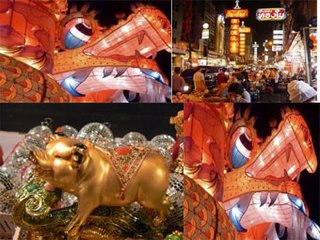
Head down to Yaowarat, Bangkok's Chinatown, where old buildings of vintage-style architecture peep through neon ideograms. Take your senses for a stroll and behold the transition from the Year of the Dog to the Reign of the Pig. With as much as 14 present of Thailand's population claiming Chinese ancestry, celebrations in Bangkok are big news Firecrackers, colourful lanterns, wonderful eating experiences, and the traditional processions of the Golden Dragon and the masked Lion Dance are just some of the exhilarating surprises to encounter.
The Year of the Pig
Based on lunar calculations and ancient traditions, Chinese astrology is still followed by the Chinese community in Thailand, despite having taken on a slightly Thai character. To the oriental mind, the pig is a symbol of good fortune, fertility and virility. Thus, this year is a fantastic time to make babies, or riches, as best fits suit. Generally, the sign of the pig embodies generosity, loyalty, passion and opulence. Someone born under the sign is said to be intellectually curious, a lover of earthly pleasures, and most respectful of others' beliefs. In the Chinese legend, the pig was last of the creatures to cross the river, thus the sign presides over the end of cycles. This year also falls under the element of fire, adding a volatile streak to the brew, which could translate as either resilience or regeneration.The origins of Chinese New Year
The legend tells of Nian, the demonic beast who liked to dine on humans on Chinese New Year's Eve. There are, however, three known things the unholy predator fears: the colour red, fire and loud noises. Contemporary practices are remnants of the ancient Chinese rituals of uniting the community against wild beasts to trick them out of their annual feast. The other story goes that various gods ascend to heaven on this night to pay tribute to the Jade Emperor - supreme among Taoist deities - and report on household affairs. Appropriate offerings are made to win favourable reports.Preparations for the celebrations
The preparations begin days before, with the ceremonial sweeping of the grounds. To the Taoist mind, cosmic order is reflected in everyday living space. Knowledge of this principle lends symbolic gravity to every act. But the design of tradition is also to bring communities together and reunite families who live far apart. The focus is on beating out the bad spirits and luring in the good times - abundance, long life and prosperity. Elaborate preparations fill the days leading up to the auspicious occasion with excitement and trepidation.Customs
Central to the celebration is the family reunion dinner on Chinese New Year's Eve. Offerings and prayers are performed at shrines to remember the ancestors, and to pass prosperity onto the family. Red paper scroll couplets inscribed with auspicious words (wishes) are hung on doorways to attract the desired attribute, be it money, luck or good family relations. Red envelopes containing money and pouches of mandarin oranges - gifts symbolic of gold - are exchanged between family members to spread the spirit of abundance. Firecrackers announce triumph over the night and scare off any potential bad spirits.Setting the scene
The Procession of the Golden Dragon is probably among the most iconic images of Chinese culture. The performance represents the Dragon King descending to the earthly realm to bestow blessings upon the worthy. Thousands rush to greet the apparition, as it is considered a good omen if the dragon passes your way, and fortunate indeed for the owner if the trail sweeps past your shop.The Lion Dance is a masked dance akin to an acrobatic feat. Usually there are two players, the 'lion' and the fan bearer, the latter being the God of Smiles. While fascinating, entertaining and richly photogenic, this ritual demonstrates how one should approach the ineffable - with good humour and, it would seem, dexterity!
Eating experiences
Symbolically, whole foods are eaten to ensure long life, endless streams of money and keeping the family name intact. Whole chickens are prepared, and the head portions given as offerings to the ancestors. Whole fish are served too, but, in this case, some must remain left over to symbolise surplus. Mandarin oranges symbolise gold, are blessed and then eaten. As is often the case, wealth is foremost on the mind.All that been said, ultimately, for most Thai-Chinese, New Year's is about reaffirming the continuity of tradition, however far it might have roamed from its origins. As the Chinese diaspora morphs each into its unique setting, a trip to Bangkok's Chinatown can enlighten even the most jaded world-traveller.
No comments:
Post a Comment